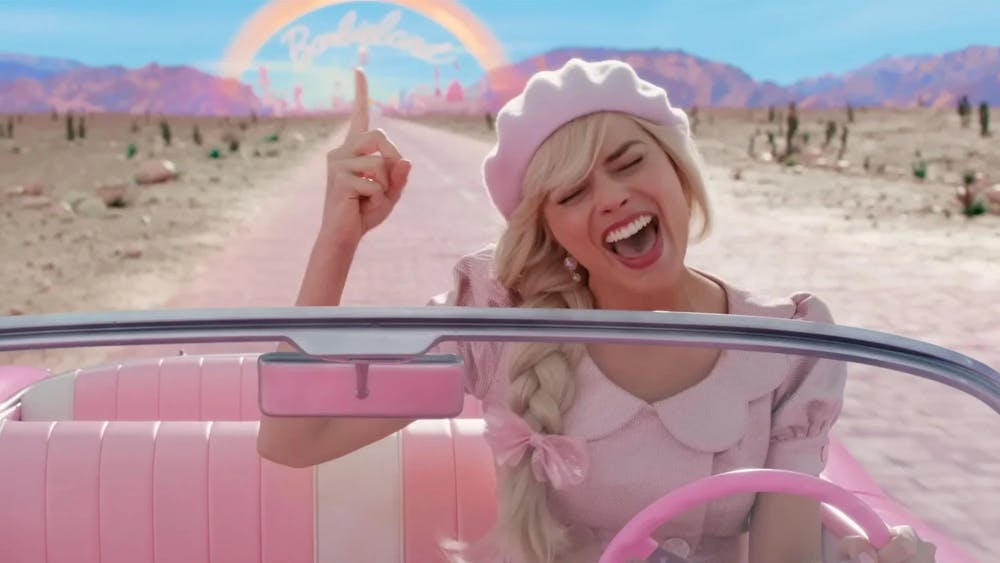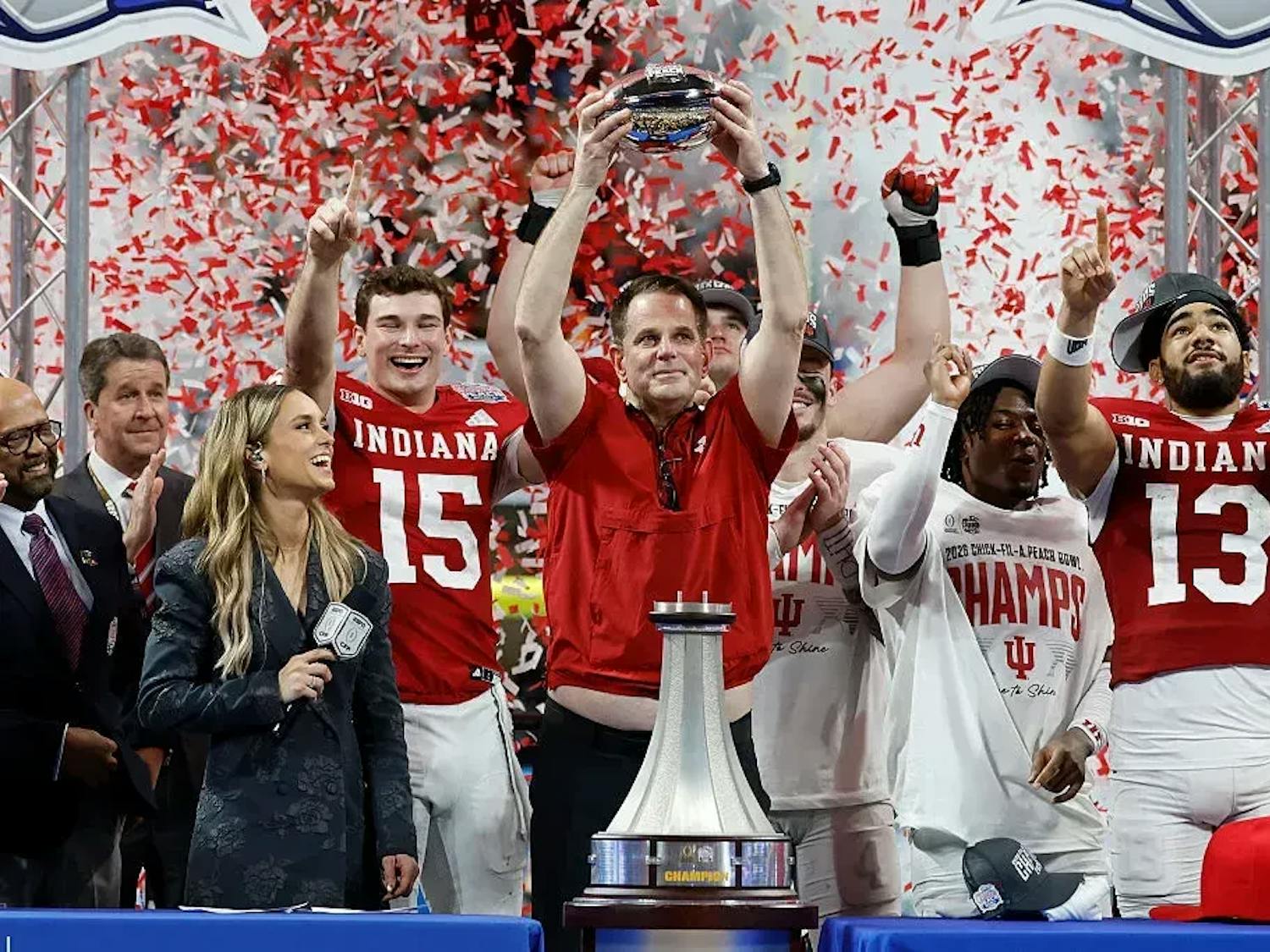*Caution: Contains spoilers for “Barbie”
Greta Gerwig’s “Barbie” made history as the first solo female-directed film to generate $1 billion at the box office, an impressive feat for any writer-director, but especially one who was previously known for her indie and mid-budget films such as “Ladybird” and “Little Women.”
Throughout her career, one common thread has tied her work together. Sometimes critical, but always empathetic, they are stories about women and girls in all of their capacities finding their way in the world. Heartfelt, hilarious and pink, “Barbie” is no exception.
Both a deconstruction of and a love letter to Barbie, the film tackles the fantastical and larger-than-life reputation of the controversial doll by humanizing her, figuratively and literally. When the audience is first introduced to Margot Robbie’s Stereotypical Barbie in an opening sequence referencing Stanley Kubrick’s “2001: A Space Odyssey,” she is a tall, looming and seemingly perfect presence, towering over the little girls staring up at her in awe.
After her perfect days in Barbieland start to go awry, she endeavors to return everything to normal. Once she ventures into the real world, however (with Ryan Gosling’s Ken in tow), she makes the earth-shattering discovery that the introduction of the Barbie doll has not solved the issues women face as the Barbies believed. This realization sends her into the beginning of an existential crisis and, ultimately, sets her on the path of self-discovery.
While tapping into memories of the girl playing with her in the real world, Barbie sheds her first tears, something she couldn’t previously do in the plastic landscape of Barbieland, where not even their oceans have real water.
All of Barbieland’s backdrops were inspired by 1950s soundstage musicals, according to Gerwig. These “wonderfully fake, but emotionally artificial spaces,” as she refers to them, are representative of Barbie’s core struggle in the movie. Once she has experienced real human emotion, she no longer feels like she belongs in this space.
While Ken also has a self-discovery arc of sorts, his is initially much less introspective. As Barbie tries to get in touch with the girl playing with her, Ken learns about the patriarchy while in the real world and attempts to take advantage of it, hoping to find purpose. Unable to be successful there, he decided to instate his own patriarchy in Barbieland.
Barbie’s journey also mirrors the experience of young girls growing up. One day everything is perfect and then, seemingly overnight, things about yourself and the world around you change.
Out and about in the world, you become more self-aware of how people perceive you in a way your male counterparts do not. The scene in the real world with Barbie and Ken rollerblading through crowds demonstrates this experience. Barbie suddenly feels self-conscious and leered at, and even gets assaulted by a man on the sidewalk, whereas Ken feels safe and even empowered.
At the core of the story are the heartfelt performances by Robbie and America Ferrera, who plays Gloria: a Mattel employee struggling to find purpose herself and reconnect with her daughter.
Robbie’s earnest and sincere portrayal of Barbie is key in getting the audience to empathize with her and see a reflection of themselves. While still getting plenty of her own moments of comedy, Robbie serves as a very grounding presence in contrast to the campy and comedic characterization of the others in Barbieland.
Ferrera’s third-act monologue delving into the contradictions of being a woman is potentially the most poignant moment of the film. Her monologue is prompted by Stereotypical Barbie feeling as if she’s “not good enough for anything,” a spiral exacerbated by her displacement due to Ken’s introduction of the patriarchy in Barbieland. The final line, “And if all of that is true for a doll just representing a woman, then I don’t even know,” bridges the gap between Barbie doll and human, Barbie fans and Barbie critics.
Here, Gerwig and co-writer Noah Baumbach do an excellent job at getting to the center of Barbie’s controversy. All of these paradoxical expectations placed on women are also the standards by which this doll is being judged, a conversation doomed to become cyclical.
This scene also makes the case that the best way to get through this journey that Barbie, and so many girls, are going through, is by leaning on other girls and women for support. And in fact, it’s crucial to Barbie’s self-discovery and humanization.
During her first encounter with Barbie creator Ruth Handler, played by Rhea Pearlman, Barbie becomes self-conscious when Ruth says that she looks different, responding “I usually look perfect.” Ruth’s response is compassionate as she assures Barbie that she looks “just right.”
Ruth is the first to suggest to Barbie that she doesn’t have to look perfect all the time, she’s enough the way she is. Barbie learns through both Ruth and Gloria that change in life is inevitable and that self-acceptance is foundational in being able to deal with it.
Gloria learns a similar lesson from her daughter Sasha (Ariana Greenblatt), as their relationship improves once Gloria embraces all the “weird and dark and crazy” aspects of herself that Sasha actually appreciates. Through her adventures and conflicts with Barbie and Gloria, Sasha is able to reconnect with a part of her childhood that she had written off, deepening the connection between her and her mom.
From Ruth and Barbie to Gloria and Sasha, “Barbie” deals with so many nuances of the relationship between mothers and daughters. Ruth even tells Barbie that she named her after her own daughter, Barbara.
“A Barbie movie is only ever going to be a mother-daughter movie on so many levels because it was Ruth Handler and Barbara—that was the relationship,” Gerwig said in a Time article.
On a large scale, all of the Barbies are able to create change in Barbieland by banding together and learning from each other. After hearing Gloria’s speech, Barbie realizes that it could have the same effect on the other brainwashed Barbies that it did on her. With the help of Gloria, Sasha, Weird Barbie (Kate McKinnon), the other exiled Barbies and Allan (Michael Cera), Barbie sets out to deprogram the affected Barbies.
For mothers and daughters, women individually, and women in a community, these lessons learned via relationships with each other offer catharsis and inspiration.
After restoring Barbieland, Barbie makes the decision to leave and become a human. Before she makes this decision, Ruth shows Barbie memories of women and girls of all ages and tells her to “feel.” From her first tears prompted by Gloria’s memories to this moment with Ruth, Barbie’s final step to humanness mirrors her first.
From Ken’s storyline that deals with the ways patriarchy can influence men and keep them from finding fulfillment to Barbie’s existential journey to find out what her purpose is and become human, “Barbie” delivers an important message for people of all ages: You are (Ken)ough.
Hanne Brandgard (she/her) is a junior journalism major minoring in Spanish and interior design. In her free time, she enjoys watching movies, reading books, and baking. She is the Culture Editor of The Campus Citizen





